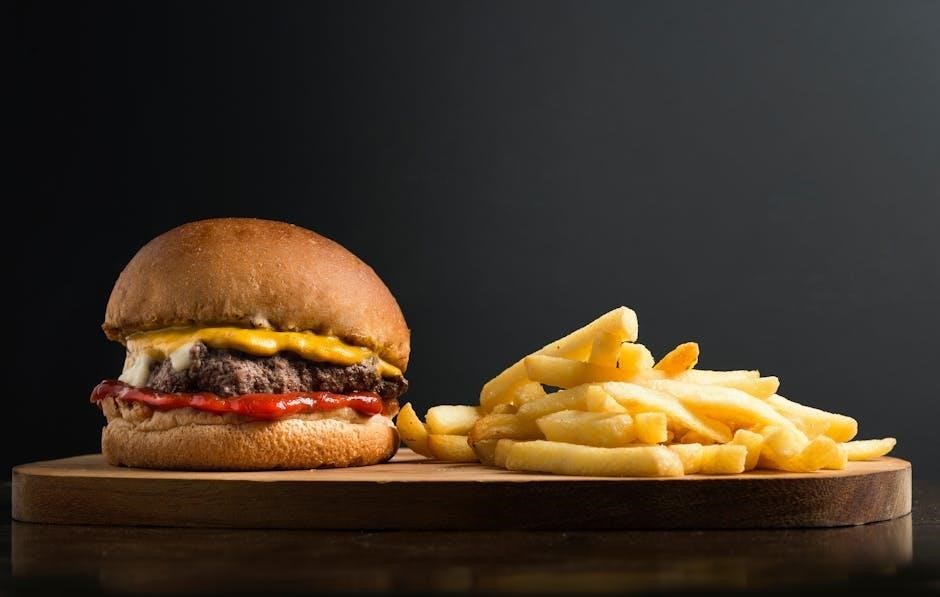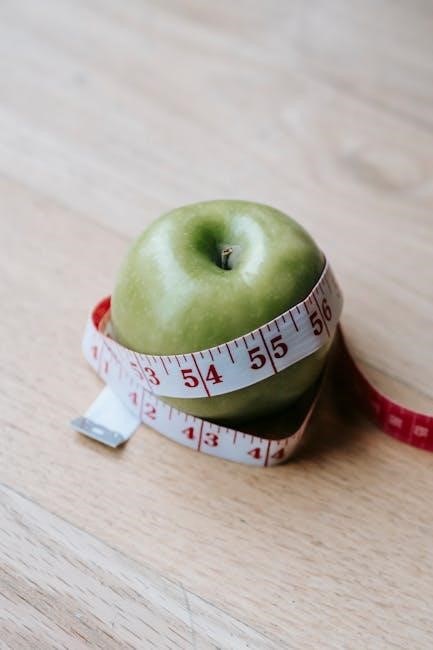A 1600 calorie meal plan is a structured eating strategy designed to support weight loss and overall health. It provides a balanced intake of nutrients while creating a calorie deficit, helping individuals achieve their dietary goals. This plan is ideal for those seeking a manageable approach to healthy eating, with customizable options to suit personal preferences and lifestyles. Explore how this plan can help you reach your wellness objectives with ease and sustainability.
Understanding the Basics of a 1600 Calorie Diet
A 1600 calorie diet is tailored for individuals with lower energy needs, such as sedentary people or those with lighter activity levels. It focuses on creating a calorie deficit for weight loss while ensuring adequate nutrition. The plan distributes calories across protein, carbohydrates, and fats to maintain balance. It’s ideal for those seeking gradual weight loss or managing specific dietary needs, with meals structured to keep you satisfied and energized throughout the day.
Why Choose a 1600 Calorie Meal Plan?
A 1600 calorie meal plan is a popular choice for weight loss and maintenance, offering balanced nutrition while creating a calorie deficit. It’s designed to prevent extreme hunger, ensuring sustainability. This plan suits various lifestyles and dietary preferences, providing flexibility. By focusing on nutrient-dense foods, it supports overall health and energy levels, making it an effective and practical option for those seeking long-term success in their weight management journey.

How to Determine Your Caloric Needs
Determining your caloric needs involves assessing your age, weight, height, activity level, and goals. Use a calorie calculator or consult a dietitian to tailor your plan effectively.
Calculating Your Daily Calorie Requirements
Your daily calorie needs depend on factors like age, weight, height, and activity level. Use an online calorie calculator or consult a dietitian to determine your baseline. For weight loss, create a deficit by consuming fewer calories than you burn. Aim for a balanced intake of proteins, carbs, and fats to ensure nutritional adequacy; Adjust your plan based on progress and lifestyle changes to maintain steady results and overall health.
Factors Influencing Caloric Intake
Caloric intake needs vary based on age, weight, height, and activity level. Metabolism, lifestyle, and overall health also play significant roles. For instance, younger individuals or those with higher physical activity may require more calories, while older adults or those with slower metabolisms might need fewer. Understanding these factors helps tailor the 1600 calorie plan to individual needs, ensuring effectiveness and sustainability for weight loss and health goals.

Benefits of a 1600 Calorie Meal Plan
A 1600 calorie meal plan promotes steady weight loss, improves nutrient balance, and supports overall health. It helps create a sustainable eating habit for long-term wellness.
Weight Loss and Management
A 1600 calorie meal plan is an effective tool for weight loss, creating a calorie deficit that promotes fat burning while maintaining energy levels. By focusing on nutrient-dense foods, it supports sustainable weight management and helps prevent excessive hunger. This structured approach ensures steady progress toward your weight goals without sacrificing nutritional balance or flavor.
Improved Nutritional Balance
A 1600 calorie meal plan emphasizes whole, nutrient-rich foods, ensuring a balanced intake of vitamins, minerals, and macronutrients. By focusing on lean proteins, whole grains, and vibrant vegetables, it helps maintain energy levels and supports overall health. This structured approach encourages mindful eating and reduces reliance on processed foods, fostering a healthier relationship with nutrition and promoting long-term wellness goals.

Structuring Your 1600 Calorie Meal Plan
Organize your meals and snacks to meet your daily calorie goal, ensuring a balance of nutrients and portion control. Tailor the plan to suit your preferences and dietary needs for sustainable success.
Breakdown of Daily Meals and Snacks
A 1600-calorie meal plan typically includes three main meals and one or two snacks, carefully portioned to meet your daily calorie and nutrient needs. Start with a balanced breakfast, such as eggs, whole grain toast, and fruit. Mid-morning, opt for a light snack like yogurt or nuts. Lunch might feature lean protein, vegetables, and a small portion of whole grains. An afternoon snack could be fresh fruit or veggies with hummus. Dinner should include a variety of colorful vegetables, lean protein, and a modest serving of carbs. Stay hydrated and ensure each meal is nutrient-dense to keep you satisfied and energized throughout the day.
Sample 7-Day Meal Plan
A 7-day meal plan provides a structured approach to your 1600-calorie diet, ensuring variety and nutrient balance. Each day includes breakfast, lunch, dinner, and snacks, with options like oatmeal, grilled chicken, quinoa salads, and steamed vegetables. Snacks such as fruits, nuts, or yogurt keep you satisfied between meals. This plan offers flexibility, allowing you to swap ingredients while maintaining calorie and nutrient goals, ensuring a sustainable and enjoyable eating experience.

Key Foods for a Balanced 1600 Calorie Diet
Focus on lean proteins, whole grains, vegetables, and healthy fats. Include fruits, nuts, and calcium-rich foods like yogurt for essential vitamins and minerals to maintain optimal nutrition levels.
Macro and Micro Nutrient Considerations
A balanced 1600-calorie diet requires careful attention to macronutrients like carbohydrates, proteins, and fats, as well as micronutrients such as vitamins and minerals. Aim for whole, unprocessed foods to ensure adequate fiber, vitamins, and minerals; Include lean proteins like poultry, fish, and legumes, paired with whole grains, fruits, and vegetables. Healthy fats, such as avocados and nuts, support heart health. Proper nutrient balance ensures energy, satiety, and overall well-being while promoting weight management and long-term health.
Hydration and Meal Timing Tips
Staying hydrated is crucial for metabolism and digestion. Aim for at least 8 glasses of water daily, incorporating herbal teas for variety. Space meals evenly throughout the day to maintain energy levels. Avoid sugary beverages and opt for water-rich foods like fruits and vegetables. Timing meals consistently helps regulate hunger and supports weight management, ensuring your 1600-calorie plan remains effective and sustainable for long-term success.

Grocery Shopping for Your Meal Plan
Plan your grocery list to include fresh produce, lean proteins, whole grains, and healthy fats. Shop seasonally and in bulk to save costs and ensure variety.
Smart Grocery List Creation
Plan meals for the week, then list essential items like lean proteins, whole grains, and fresh vegetables. Organize by store sections to save time. Include portion-controlled options to avoid overbuying. Buy in bulk for non-perishables and use coupons or shop sales for cost savings. Prioritize seasonal produce for freshness and value. Check expiration dates to ensure items last throughout the week. Avoid processed foods to maintain dietary goals.
Budget-Friendly Shopping Strategies
Plan meals around weekly sales to reduce costs. Buy in bulk for non-perishable items like grains and canned goods. Use coupons or discount apps for additional savings. Opt for affordable protein sources like beans or eggs. Purchase seasonal produce for better prices. Avoid processed foods to save money and maintain dietary goals. Shop store-brand options, which are often cheaper and equally nutritious. This approach ensures a balanced diet while staying within budget.

Common Mistakes to Avoid
- Skipping meals can disrupt metabolism and lead to overeating.
- Neglecting hydration impacts weight loss and overall health.
- Over-restricting calories may cause nutrient deficiencies and fatigue.
Pitfalls in Calorie Counting
When following a 1600 calorie meal plan, common pitfalls include inaccurate food measurements, overlooking hidden calories in sauces or condiments, and overestimating physical activity levels. These errors can lead to consuming more calories than intended, hindering weight loss progress. Additionally, relying solely on calorie counting without considering nutrient balance may result in inadequate nutrition. To avoid these mistakes, use precise measuring tools and consult a dietitian for personalized guidance.
Maintaining Long-Term Adherence
Long-term adherence to a 1600 calorie meal plan requires consistency and flexibility. Focus on gradual lifestyle changes rather than quick fixes to avoid burnout. Incorporate a variety of nutrient-dense foods to keep meals engaging and satisfying. Regularly track progress and adjust portions or calorie intake as needed. Seeking support from a dietitian can also help tailor the plan to suit evolving needs, ensuring sustainability and success in the long run.

Tracking Progress and Adjustments
Use a calorie calculator and food diary to monitor intake and weight changes. Regularly assess progress and adjust portions or meal plans to maintain momentum and results.
Monitoring Weight and Measurements
Regularly tracking weight and body measurements helps assess progress. Weigh yourself weekly, measure body fat, and monitor inches lost. Use a food diary to log meals and portion sizes. Adjust the meal plan based on changes to ensure goals are met. This data provides insights into what works and helps maintain motivation. Consistent monitoring ensures the plan remains effective and tailored to individual needs.
Adjusting the Plan for Optimal Results

As you progress, tweak your meal plan to suit your needs. Adjust portion sizes, swap ingredients, and modify meal timing for better results. Reassess caloric intake and macronutrient balance to ensure alignment with goals. Incorporate new recipes and foods to keep meals exciting. Regularly review progress and consult a dietitian if needed. Flexibility is key to achieving and maintaining desired outcomes effectively.

Seeking Professional Guidance
Consulting a registered dietitian or healthcare provider can provide personalized advice and support. They offer tailored recommendations to help achieve your wellness goals safely and effectively.
Role of a Registered Dietitian
A registered dietitian plays a crucial role in creating a personalized 1600-calorie meal plan. They assess individual needs, ensuring the diet is nutritionally balanced and tailored to specific health goals. Dietitians offer expert advice on meal planning, portion control, and nutrient intake, helping individuals maintain a sustainable and healthy eating routine. Their guidance supports long-term success and overall wellness.
When to Consult a Healthcare Provider
Consult a healthcare provider before starting a 1600-calorie meal plan, especially if you have health conditions like diabetes or heart disease. They will assess your suitability for the plan and ensure it aligns with your medical needs. This is crucial for those on medications or with nutritional deficiencies. Seeking professional advice guarantees a safe and effective approach to your dietary goals.
